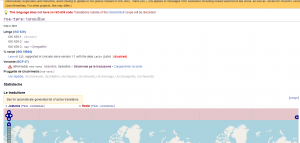Portal talk:Nap/LiquidThreads
- [View source↑]
- [History↑]
Contents
| Thread title | Replies | Last modified |
|---|---|---|
| Coordinazione | 3 | 17:24, 18 December 2019 |
| Statistics on Portal:roa-tara | 1 | 22:15, 11 September 2019 |
@Sannita, Chelin, and C.R.: Ci troviamo davanti alle difficoltà della lingua napoletana scritta, in difficoltà davanti ai neologismi. Decidiamo alcune parole tecniche in napoletano, per essere uniformi su tutti i progetti e coordinarci qui.
- Siamo sicuri che Intestazzione sia napoletano? Sarebbe la "testata" (in-testa-zione, da tradurre con "capata", che mi sembra un po' violento. Di contro, ho trovato "capa 'e lietto" (testata di letto). Si potrebbe interpretare "intestazione come "inizio", ossia "accumenzaglia". Bisognerebbe vedere se vi è del vocabolario giornalistico napoletano.
- Attenzione nel lasciare lo spazio fra due apostrofi dritti ' altrimenti MediaWiki ci inserisce il corsivo (come in MediaWiki:Proofreadpage index size/nap).
- Cercare è un italianismo, su nap.wiki si usa da tempo il verbo ascià (cercare, andare alla ricerca – Alt.)
- Informazione dovrebbe essere in napoletano "frummazione" (ma non ricordo la fonte). Ho trovato su Pen: nfurmà - nfurmaziò (nfurmazzione?)
- Account, lo traduciamo con "cunto" (conto, favola) se vi va. Ma si potrebbe anche usare la parola "accùnto": cliente più o meno abituale di un negozio (Alt.)
- Testo, lo tradurrei in "tiesto", ma questo ha piuttosto il significato di "tomo a carattere giuridico", come per l'italiano "testo di legge". Alternative?
- Usiamo "fremmare" per "bloccare", "sfajere" per "annullare/rollback" e "cagnà/cagnare" per "modificare"
NB: Alt.: A. Altamura, Dizionario dialettale napoletano (1968); Pen: C. Pennino, Parlammoce accussì (2014)
Saluti
Ciao, è arrivata anche a me la notifica di questa discussione ma devo prendere per buono quello che dite, non conoscendo il napoletano. Mi occupo del portale del tarantino (che a mio avviso è stato erroneamente collassato in quello napoletano, come variante), quindi sinceramente non riesco a dare un contributo fattivo alla discussione.
Se può esservi utile, in tarantino ho tradotto così i vostri punti:
# 'Ndestazione # Non c'è il doppio apostrofo # Cirche # 'Mbormazione / 'Mbormaziune # Cunde utende (lo uso per il trermine account) cunde (lo uso per History) # Teste # Bloccà (per stop), annullà (per rollback / abort), cangià (per edit)
Buon proseguimento
Ottimo! d'accordo 100%
# Cap' 'e paggena ? # ' ': OK # Ascià # Nfurmaziò # Cunto # Testo. Ccà se putesse fà Testo --> 'Testo' # Usiamo "fremmare" per "bloccare", "sfajere" per "annullare/rollback" e "cagnà/cagnare" per "modificare". Ok
Note that point 2, if you want real apostrophes, you can still use U+2019 (’) which is never interpreted as creating a wikisyntax for italics (when doubled) or bold (when tripled).
- The ASCII apostrophe is not a real apostrophe
- Inserting a space between would not be the correct orthograph for an elision that is normally glued with the first character of the following word without any linebreak opportunity between the two glued words.
- If you still prefer to use ASCII apostrophes, you can still glue them by inserting a wiki-separator that generates nothing but avoids the interpretation as italics/bold in the MediaWiki syntax. One way to do that is to write
'<nowiki/>' - But it just looks simpler to just use
’’with U+2019... (note: you cannot always insert a wikisyntax in all messages, as they are not all parsed with MediaWiki, some messages become plain HTML or use different parsers in different languages (e.g. PHP, Python, Shell...) that also frequently have their own usage of ASCII apostrophes or require some escaping. Using U+2019 however should work everywhere (it's usually not needed in English, but even English typographs prefer the U+2019 curly apostrophe to the compatibility ASCII apostrophe-quote which has too many different uses and meanings, including when they are used as quotation marks in human text, even if programming languages usually use the same quotation mark for the first and last occurence in a quoted string not really read by humans but processed by programming language parsers). - The curly apostrophes are usually better readable for end users, and are still found in plain text searches on all search engines (including the default search in MediaWiki).
- The ASCII apostrophe however remains used in page titles in most wikis without needing the addition of a redirect or needing to pass via a search result page, but is never needed anywhere else in the document bodies of human-readable text.
Statistics on Portal:roa-tara
Hi, I've understood you want to collapse Tarandine dialect as variant of Neapolitan language, but the statistics on Tarandine portal is useful. Please, is it possible to re-add? Thanks in advance --Joe Taras (talk) 13:42, 11 September 2019 (UTC)
- They are already displayed, they have never been hidden ! Look better. Verdy p (talk) 14:39, 11 September 2019 (UTC)
- Dear, this is the screenshot of Portal:roa-tara

--Joe Taras (talk) 14:49, 11 September 2019 (UTC)
- They are displayed in Portal:Nap (as a variant)...: you were talking here on the talk page for Napolitan. Verdy p (talk) 15:09, 11 September 2019 (UTC)
- I write here as main page, but the request is show Statistics onPortal:roa-tara as in the topic title --Joe Taras (talk) 15:16, 11 September 2019 (UTC)
- OK this is a caveat of the portal template: it contains a test to avoid displaying the same statistics several times (for the language code of the portal itself and for a variant; that second portal was specifying a variant and disabled the main code, I've made the reverse, but this adds an extra line of text which is still harmless here). Your message would have been clearer if you had used the correct talk page first, because that's where you posted and I replied about the Nap portal. Verdy p (talk) 15:21, 11 September 2019 (UTC)